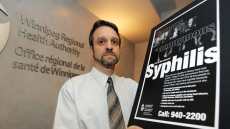VANCOUVER — The question of who will eventually care for their autistic son, Adam, weighed heavily on Deborah Pugh and her husband until their daughter stepped forward to lift the burden.
Adam Elsharkawi, 24, will live with his parents in North Vancouver, B.C., working part-time in a bakery, and will eventually move in with his sister, Jemana, and her husband. Adam hasn't been told yet that he will one day have to move.
Pugh knows parents of children with autism who aren't as lucky.
"It makes me feel incredibly fortunate that my daughter is actually prepared to do this, incredibly fortunate," she said.
Pugh said a "tsunami of teens with autism" will soon reach adulthood, and many families are struggling to plan for their children's future care.
One in 68 children live with the complex neurobiological condition that affects their ability to communicate and interact with others and often results in repetitive behaviour and attachment to routines or objects, said the B.C. Ministry of Children and Family Development.
Some will be able to live independently but others won't, as the symptoms range from mild to severe.
There has been a "staggering increase" in autism funding support since 2004, when only 600 youths under age 19 were assisted, compared with the current 11,200, the ministry said in an email.
Families in B.C. receive $22,000 in funding for intervention services annually for each child up to the age of six and $6,000 after that until the age of 18.
At age 19, youths age out of the system, and as of last July, the number of 18-year-olds receiving funding was 621, the ministry said.
The ministry said support is available after 19, but Pugh said waiting lists for supportive housing are long, and $900 provincial-disability payments are not enough.
Solutions for housing are so problematic that a New York-based advocacy group has launched an US$150,000 international competition.
Autism Speaks is offering three prizes of US$50,000 each for those who can provide home- and residential-support solutions for people who need help.
Spokeswoman Lisa Goring said the prize is a way to engage the global community.
"Most adults with autism live with their families long into adulthood, and for many families they're very concerned about who will take care of their adult children with autism once they're no longer able to do that," she said.
The group's director of adult services Dave Kearon said the contest deadline is March 1, 2016, but dozens of ideas have already been submitted, most from the United States, although other entries have arrived from Canada, Spain, Sweden and Iraq.
Dr. Anthony Bailey, a University of British Columbia psychiatry professor, said many young adults with autism live at home because they can't find well-paying jobs, lack skills or have additional psychological issues, like anxiety or depression.
Other people are diagnosed very late in life, sometimes when their parents are seniors, he said.
"Often the issues comes to attention first through a geriatrician," he said, noting a doctor will ask to see a patient and only realize an adult child is receiving care at home without government aid.
People with autism can be very skilled and offer society much but are hampered by employment, housing and mental-health issues, he said, adding governments around the world must recognize the problem.
Kalliopi Tochtamis, who lives in Montreal with her husband and three daughters, said she doesn't know what will happen to her eldest, Jennifer Romano, when she can't care for her anymore.
"Those are questions I don't even have the answers to," she said.
Jennifer, 16, has "mild" autism, and while the teen helped to organize a fundraiser and wants to live independently, she can't take the bus alone because she'll get lost, said Tochtamis.
She said Jennifer is currently learning skills at high school that she'll need to survive in the world.
Back in North Vancouver, Jemana Elsharkawi and her husband are planning to become Adam's primary caregivers.
Because of Metro Vancouver's high housing prices, they will buy a home on Vancouver Island that will have room for Adam, and the caregiving transition will be gradual, she said.
While her parents didn't force her into caring for her brother, she said she pressured herself, feeling a natural obligation to support her family.
"It's a big commitment," she said. "It's not only a matter of committing to having your own family and supporting your own children, you're also going to be supporting, effectively, someone else's child, your sibling, for possibly the remainder of your life."





